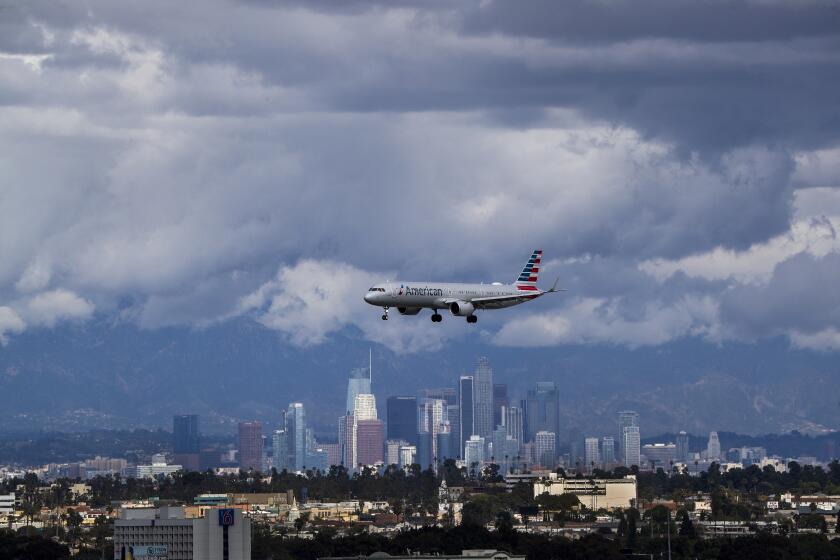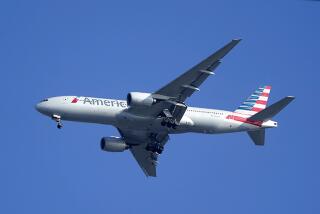Major airlines reach deal for $25 billion in federal aid
- Share via
U.S. airlines reached preliminary agreements with the Treasury Department to access billions of dollars in aid as the government tries to shore up one of the industries hardest hit by the coronavirus pandemic.
The deal covers all major U.S. carriers, the Treasury announced Tuesday. American Airlines Group Inc., for example, said it would get $5.8 billion in total support; Southwest Airlines Co. said it would receive $3.2 billion. The government is doling out $25 billion in payroll assistance allocated for passenger carriers in the $2.2-trillion stimulus package signed into law March 27.
“We welcome the news that a number of major airlines intend to participate in the Payroll Support Program,” Treasury Secretary Steven T. Mnuchin said in the statement. The program “will support American workers and help preserve the strategic importance of the airline industry while allowing for appropriate compensation to the taxpayers.”
The aid represents a temporary lifeline for airlines after the outbreak and government travel restrictions erased all but 5% of daily passenger demand in the United States. Forced in some cases to pay more in refunds than they were taking in from new ticket sales and fees, carriers have cut capacity as much as 80% and parked thousands of planes; it’s the industry’s biggest-ever disruption.
The Treasury expects to start doling out the funds as soon as this week, according to a person familiar with the matter.
Airlines that have spent much of their free cash flow on stock buybacks will need to improve worker pay and legroom if they want taxpayer money.
Airlines that agreed to participate also included Alaska Air Group Inc., Delta Air Lines Inc., JetBlue Airways Corp, United Airlines Holdings Inc., Allegiant Airlines, Frontier Airlines, Hawaiian Airlines and SkyWest, according to the Treasury.
The sometimes contentious process of hammering out agreements with the airlines was “neither easy nor perfect,” but it was needed to protect about 750,000 airline industry jobs, said Rep. Peter DeFazio, the Oregon Democrat who is chairman of the House Transportation Committee.
DeFazio, who has been critical of previous bailout programs, said the use of funds to cover payrolls should be the model for all future assistance programs.
Airlines aren’t depending on federal funds alone, having tapped credit markets for billions of dollars in new loans, as well as existing revolvers. Tens of thousands of employees have volunteered for time off, from unpaid short-term voluntary leaves to early retirement.
The government is requiring large carriers to repay some of the assistance through low-interest loans. The Treasury also has the ability to take stock warrants representing a portion of the aid, a provision initially met with some pushback from airlines, their employee unions and some members of Congress.
Not all airlines have disclosed the details of their aid packages yet. But in Southwest’s case, the company will receive $2.3 billion in direct payroll support and a nearly $1 billion unsecured loan with a 10-year term. The Dallas-based carrier will issue 2.6 million warrants to the Treasury.
American’s package includes a payroll grant of $4.1 billion and a loan of $1.7 billion. The carrier said it also will seek a separate $4.75-billion loan from the Treasury. It said it would disclose warrants for the government in a subsequent regulatory filing.
“With this level of assistance, we now believe we have the financial resources necessary to help us withstand this crisis and be in position to serve the traveling public when they are ready to start flying again,” American Chief Executive Doug Parker and President Robert Isom said in a message to employees.
The Fort Worth, Texas-based carrier said it would further reduce its flight schedule for June and beyond. About 32,000 employees have chosen to retire early, take reduced work or take paid leave, and American will reopen opportunities for more to do the same.
Mohsin and Schlangenstein write for Bloomberg.
More to Read
Inside the business of entertainment
The Wide Shot brings you news, analysis and insights on everything from streaming wars to production — and what it all means for the future.
You may occasionally receive promotional content from the Los Angeles Times.











